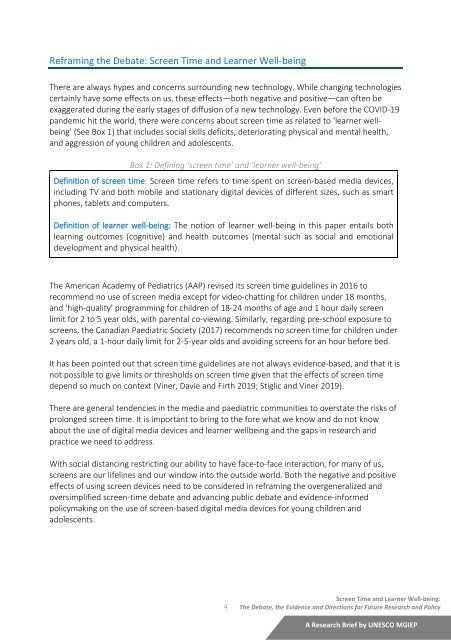Screen Time and Learner Well-being
The Debate, the Evidence and Directions for Future
The Debate, the Evidence and Directions for Future
Create successful ePaper yourself
Turn your PDF publications into a flip-book with our unique Google optimized e-Paper software.
Reframing the Debate: <strong>Screen</strong> <strong>Time</strong> <strong>and</strong> <strong>Learner</strong> <strong>Well</strong>-<strong>being</strong><br />
There are always hypes <strong>and</strong> concerns surrounding new technology. While changing technologies<br />
certainly have some effects on us, these effects—both negative <strong>and</strong> positive—can often be<br />
exaggerated during the early stages of diffusion of a new technology. Even before the COVID-19<br />
p<strong>and</strong>emic hit the world, there were concerns about screen time as related to ‘learner well<strong>being</strong>’<br />
(See Box 1) that includes social skills deficits, deteriorating physical <strong>and</strong> mental health,<br />
<strong>and</strong> aggression of young children <strong>and</strong> adolescents.<br />
Box 1: Defining ‘screen time’ <strong>and</strong> ‘learner well-<strong>being</strong>’<br />
Definition of screen time: <strong>Screen</strong> time refers to time spent on screen-based media devices,<br />
including TV <strong>and</strong> both mobile <strong>and</strong> stationary digital devices of different sizes, such as smart<br />
phones, tablets <strong>and</strong> computers.<br />
Definition of learner well-<strong>being</strong>: The notion of learner well-<strong>being</strong> in this paper entails both<br />
learning outcomes (cognitive) <strong>and</strong> health outcomes (mental such as social <strong>and</strong> emotional<br />
development <strong>and</strong> physical health).<br />
The American Academy of Pediatrics (AAP) revised its screen time guidelines in 2016 to<br />
recommend no use of screen media except for video-chatting for children under 18 months,<br />
<strong>and</strong> ‘high-quality’ programming for children of 18-24 months of age <strong>and</strong> 1 hour daily screen<br />
limit for 2 to 5 year olds, with parental co-viewing. Similarly, regarding pre-school exposure to<br />
screens, the Canadian Paediatric Society (2017) recommends no screen time for children under<br />
2 years old, a 1-hour daily limit for 2-5-year olds <strong>and</strong> avoiding screens for an hour before bed.<br />
It has been pointed out that screen time guidelines are not always evidence-based, <strong>and</strong> that it is<br />
not possible to give limits or thresholds on screen time given that the effects of screen time<br />
depend so much on context (Viner, Davie <strong>and</strong> Firth 2019; Stiglic <strong>and</strong> Viner 2019).<br />
There are general tendencies in the media <strong>and</strong> paediatric communities to overstate the risks of<br />
prolonged screen time. It is important to bring to the fore what we know <strong>and</strong> do not know<br />
about the use of digital media devices <strong>and</strong> learner well<strong>being</strong> <strong>and</strong> the gaps in research <strong>and</strong><br />
practice we need to address.<br />
With social distancing restricting our ability to have face-to-face interaction, for many of us,<br />
screens are our lifelines <strong>and</strong> our window into the outside world. Both the negative <strong>and</strong> positive<br />
effects of using screen devices need to be considered in reframing the overgeneralized <strong>and</strong><br />
oversimplified screen-time debate <strong>and</strong> advancing public debate <strong>and</strong> evidence-informed<br />
policymaking on the use of screen-based digital media devices for young children <strong>and</strong><br />
adolescents.<br />
4<br />
<strong>Screen</strong> <strong>Time</strong> <strong>and</strong> <strong>Learner</strong> <strong>Well</strong>-<strong>being</strong>:<br />
The Debate, the Evidence <strong>and</strong> Directions for Future Research <strong>and</strong> Policy<br />
A Research Brief by UNESCO MGIEP

















